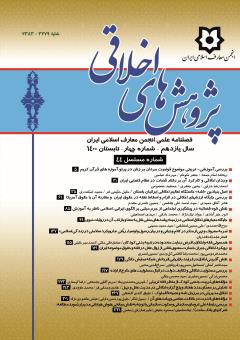تحلیلی بر معمّای عدد هفتاد و پنج گزاره اخلاقی در حدیث عقل و جهل
محورهای موضوعی : اخلاق و تربیت اسلامیهادی وحدانی فر 1 , محمد داوودی 2
1 - قم
2 - پژوهشگاه حوزه و دانشگاه، قم
کلید واژه: حدیث عقل و جهل, ترادف معنایی, مفاهیم و مصادیق اخلاقی, عدد هفتاد و پنج, نقد,
چکیده مقاله :
حدیث عقل و جهل از جمله احادیث مهم اخلاقی و تربیتی است که به بيان لشکریان عقل و جهل تحت عنوان فضایل و رذایل پرداخته است؛ از این رو میتواند به عنوان سند و منشور اخلاق و تربیت امام صادق (علیه السلام) نام گذاری گردد؛ اما نكتة مهم حدیث اين است كه تعداد سربازان عقل و جهل كه در متن روايت بیانشده بيش از عدد هفتادوپنج است كه در ابتداي روايت به آن تصریحشده است، چنانکه برخی نقلها، تعداد سربازان عقل و جهل را بالغبر 78، 80،81، 82 یا 83 ذکرنمودهاند. لذا در این خصوص دیدگاه شارحان بزرگ با یکدیگر مختلف بوده است. چنانکه میرداماد در میزان عدد 75دچار سهو شده و ملاصدرا شیرازی نیز اظهار ناتوانی بر فهم عدد 75 نموده است اما در مقابل برخی شارحان بزرگ حدیث از جمله؛ شیخ بهایی، فیض کاشانی، شریف شیرازی با استناد به برخی واژگان در متن روايت، قائل به ترادف معنایی بوده و علت آن را سهو راویان یا ناسخان یا معانی قریبه و خفیّه دانستهاند و برخی دیگر از جمله؛ ملاصالح مازندرانی، ملاخلیل قزوینی، علامه مجلسی به عدم ترادف معنایی قایل گشتند. مقاله حاضر ضمن بیان دیدگاههای مختلف شارحان و تجمیع منابع حدیثی به معرفی و تبیین گزارههای اخلاقی و نقد آنها پرداختهاست و معتقد است با توجه به اختلاف منابع و نُسخِ، گزارههای اخلاقی فراتر از توجیه ترادف معنایی است و در مازاد بر عدد 75 سرباز عقل و جهل سهو از ناحیه امام (علیه السلام) [به خاطر مقام عصمت]، ناسخان و راویان [به خاطر وثاقت و ضابط بودن] صورت نگرفتهاست لذا نظریه عدم ترادف معنایی قابل قبول است؛ زیرا روایت عقل و جهل در صدد بیان مفهوم عدد، بیان کثرت و امهّات گزارههای اخلاقی و تربیتی تحت دو عنوان کلی عقل و جهل و خیر و شر است.
The hadith of wisdom and ignorance is one of the important moral and educational hadiths which has expressed the armies of wisdom and ignorance under the title of virtues and vices. The important point of the hadith is that the number of soldiers of wisdom and ignorance stated in the text of the narration is more than seventy-five, which has been specified at the beginning of the narration; as in some narrations, the number of soldiers of wisdom and ignorance has been mentioned as 78, 80, 81, 82 or 83. Although great commentators such as Mirdamad have made a mistake in the number, and Mulla Sadra Shirazi has ignored on the number 75, but on the contrary, some great commentators of hadith, including Sheikh Baha'i, Feyz Kashani, Sharif Shirazi, have considered semantic synonymy by quoting some words in the text of the narration. They have attributed this to the mistake of narrators and amanuenses, or near and secret meanings. Some others, such as Mullah Saneh Mazandarani, Mullah Khalil Qazvini, Allameh Majlisi, have emphasized the lack of semantic synonymy. The present article, while expressing the different views of the commentators and aggregating the sources of hadith, has introduced and explicated the moral propositions and their critique, and believes that due to the differences between the sources and the manuscripts of hadith, the moral propositions are beyond the justification of semantic synonymy. Therefore, we consider the theory of lack of semantic synonymy acceptable and believe that no mistake has been made by the Imam (as), amanuenses and narrators of hadith. Rather, the narration of wisdom and ignorance seeks to express the concept of number and mention the abundance and principles of moral and educational propositions under the two general titles of wisdom and ignorance, and good and evil.
